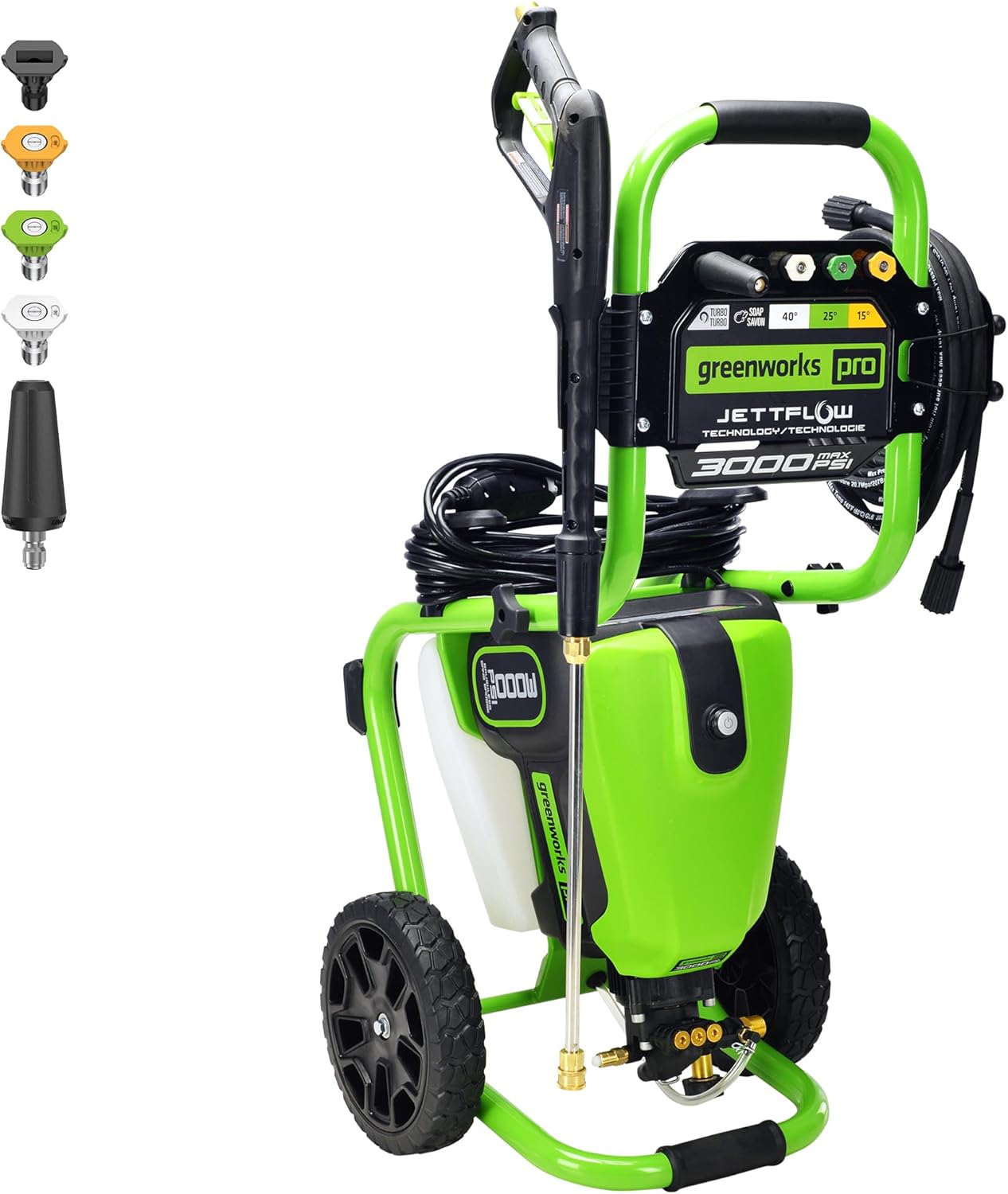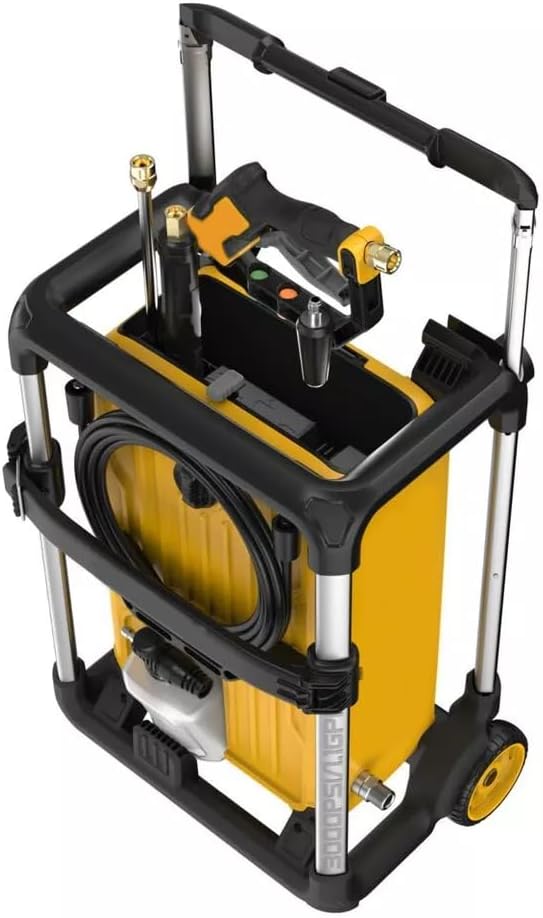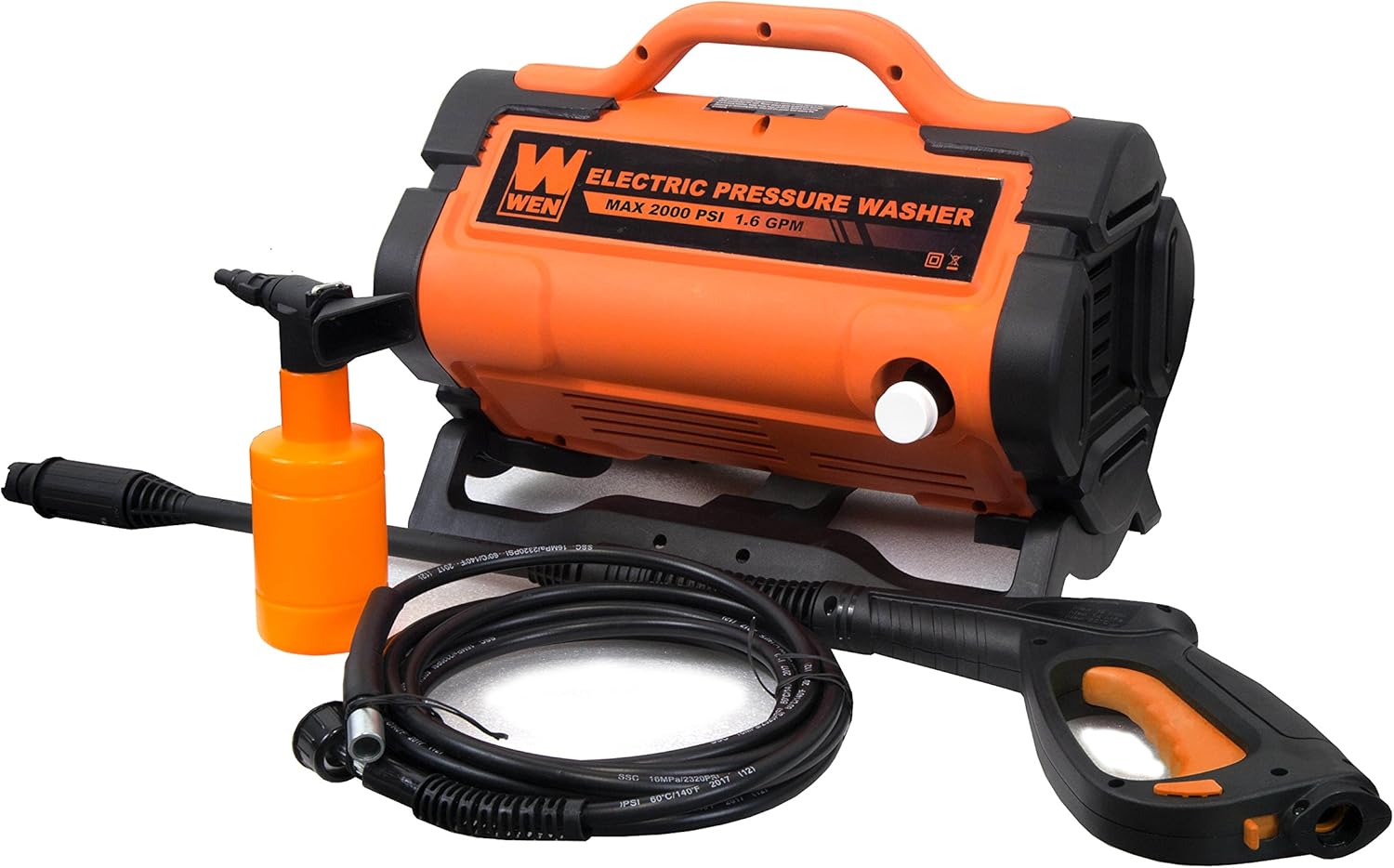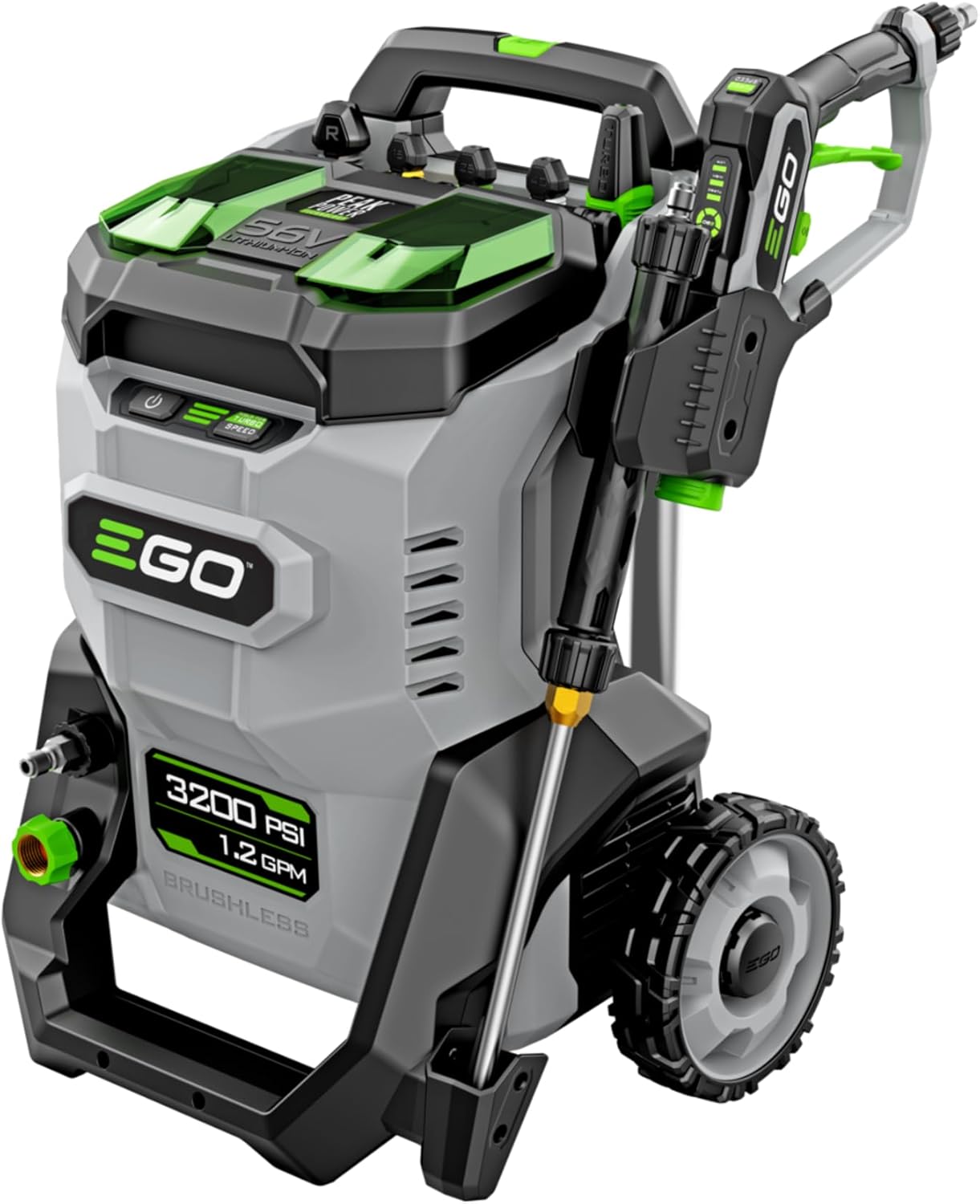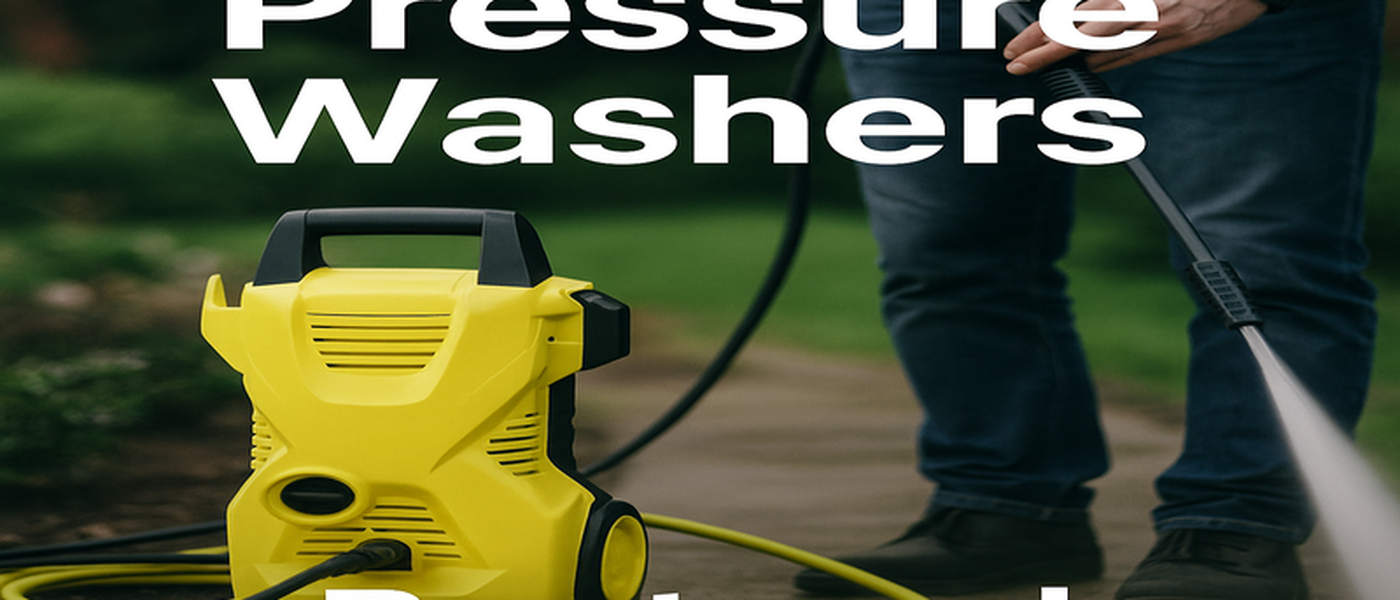
Welcome to our comprehensive guide on electric pressure washers – the easiest, quietest way to blast away grime at home. Today’s electric models deliver impressive cleaning power while being user-friendly and eco-conscious, so you can spruce up your patio, car, or siding without the hassles of gas. Unlike loud gas washers, electrics start with a button push, have lower upkeep, and emit no fumes. They’re also more affordable to run (no gasoline to buy) and can save you money over time. In this article, we’ll explain why electric pressure washers are a smart choice for homeowners, how we tested the top models, and which ones came out on top in our 2025 round-up.
Why Choose an Electric Pressure Washer?
Electric pressure washers have become popular with DIYers and homeowners because they’re easy on noise, cost, and the environment. For example, one review notes that electric units are “easy to start, their motors run quietly relative to a gas engine, and they don’t require the same maintenance” as gas models. Here are the main benefits of going electric:
- Quiet, Low-Maintenance Operation: Electric units run on household power, so there’s no noisy engine or stinky exhaust. In fact, they operate much quieter than a gas washer. With no gas or oil to change, they require minimal maintenance – usually just rinsing and occasional pump lubrication. Popular mechanics advises storing them indoors in winter since they have no fuel that can degrade.
- Cost Savings and Efficiency: You avoid spending money on gasoline and oil. Many electrics include energy-saving features, like auto-shutoff pumps that conserve power when you stop spraying. Overall, electric washers tend to be more affordable than gas models upfront and over their lifetime.
- Versatility for Home Use: Modern electric washers can tackle a wide variety of jobs – from washing cars and patios to cleaning decks and siding – typically handling 2,000–3,000 PSI (pounds per square inch) with flow rates up to ~2.5 GPM (gallons per minute). They may not match the extreme power of a big gas unit, but they excel on everyday tasks without fear of overdoing delicate surfaces. The Spruce summarizes this well: electric washers are “easier to use” and “relatively quiet,” making them ideal for lighter cleaning chores.
- Eco-Friendliness: Running on electricity, they produce zero emissions during use and typically consume much less energy overall. In contrast, gas washers can generate up to 100 decibels of noise and burn fuel that emits pollutants. Choosing electric helps you reduce noise pollution and your carbon footprint.
In short, if you want a pressure washer that’s user-friendly, low-maintenance, and good for the planet, an electric model is likely the best fit for you. Next, let’s look at how we evaluated the top models on the market.
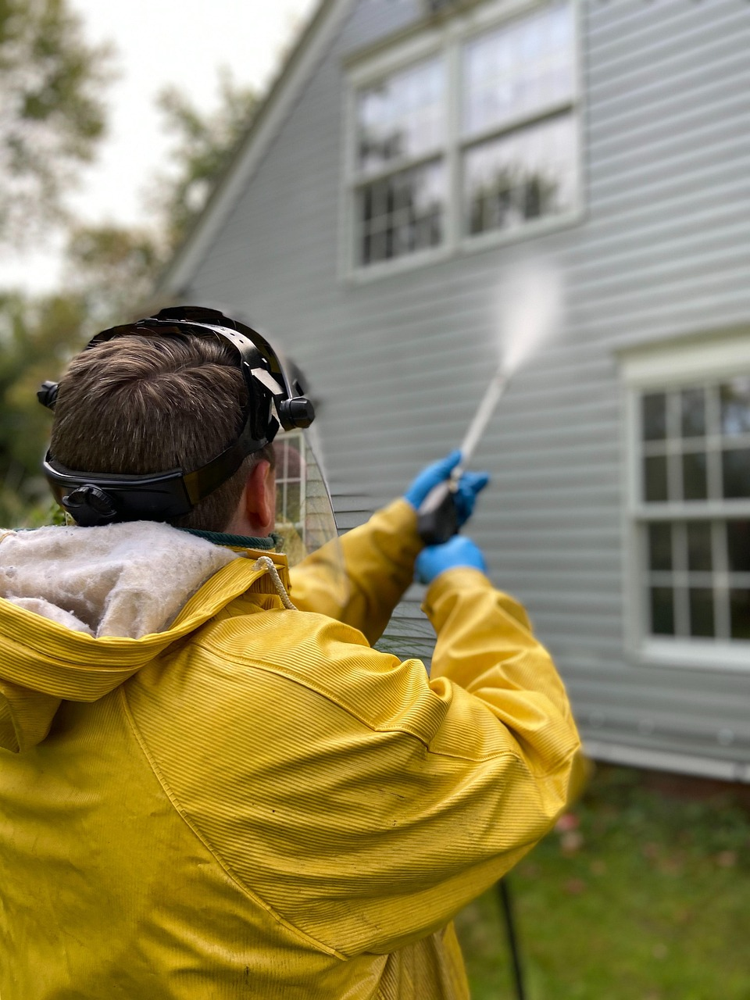
How We Tested
To identify the best electric pressure washers, our team put each model through real-world cleaning tests and expert evaluations. We washed everything from concrete driveways and patio furniture to cars and vinyl siding. During testing, we measured key performance metrics such as PSI (pressure) and GPM (water flow), and evaluated ease-of-use features (like hose length, trigger comfort, and wheel quality). Our reviewers noted how each machine performed on tough tasks like removing mildew, moss, or grease. We also checked durability by inspecting build quality and even letting machines run for extended periods to spot potential weaknesses.
Performance scores came from hands-on trials: for example, if a washer could clear dirt quickly without stalling or overheating, it scored higher. We monitored noise levels and stability (did it tip easily?), and considered design features like onboard storage for nozzles and detergent. In addition, we consulted expert editors and existing test data – for instance, Popular Mechanics had their editor wash cars and brick pavers with these machines to confirm our findings.
Throughout testing, safety was a priority. We always wore eye protection and followed guidelines (starting with a wide spray nozzle, maintaining safe distances).
Our goal was to simulate typical homeowner use: quick setup, effective cleaning, and minimal fuss. The result is this list of Top Picks – five outstanding electric pressure washers in different categories, each vetted under the toughest conditions.
Top Picks: Best Electric Pressure Washers of 2025
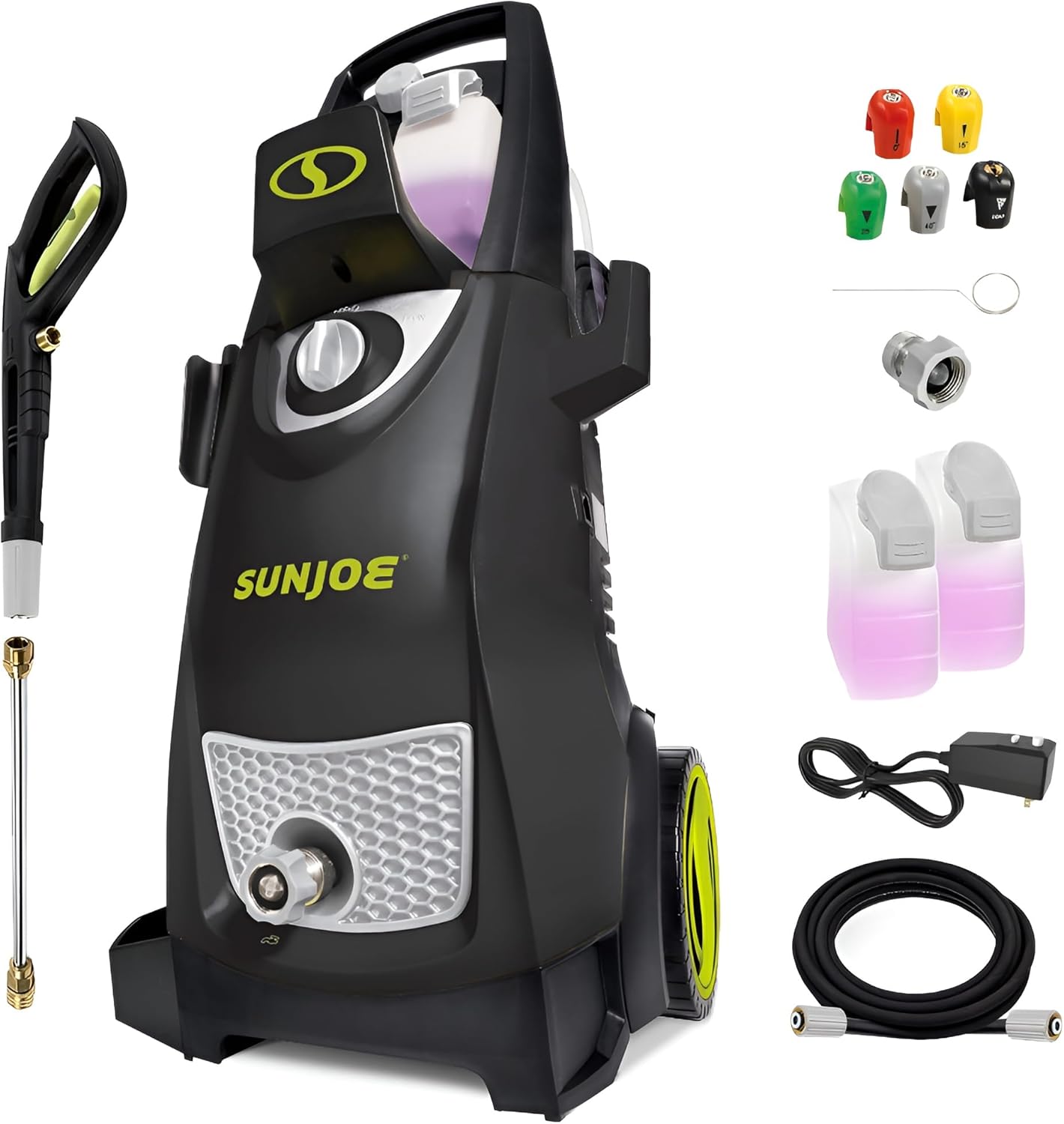
Sun Joe SPX3000
Dual detergent tanks; auto-shutoff
pump
Each of the above picks has been thoroughly reviewed by our team. Below are detailed reviews, including key features, pros & cons, tester insights, and the ideal buyer for each model.
Best Overall: Greenworks GPW3000 Electric Pressure Washer

- Key Features: The Greenworks GPW3000 is a 3000 PSI max-pressure machine (with 1.1 GPM at full pressure) powered by a high-efficiency brushless motor. This brushless design not only delivers impressive power but also extends motor life. It comes with multiple quick-connect nozzles (including a turbo nozzle), a foam cannon attachment, a long 35-foot high-pressure hose, and wheels for easy maneuverability. Plus, Greenworks backs it with a 3-year tool warranty and 10-year motor warranty – among the best on the market.
- Pros: Delivers near-gas power in an electric unit. In tests, the GPW3000 output was consistently high, making quick work of tough dirt and grime. Reviewers found that its 35-ft hose and large 12-inch wheels let you cover wide areas without repositioning often. The brushless motor means it starts easily (push-button operation) and runs cooler/quieter. PWMA certification ensures it truly meets 3000-PSI performance. Overall, it checks almost every box for performance and durability.
- Cons: It is one of the more expensive models (~$400–$450 retail) and fairly heavy. Some users might find it bulky to store (though it is still easier than a gas unit). Because it runs at maximum power, you may go through cleaning agents faster when using the high-pressure settings.
- Tested Insights: In our trials, the GPW3000 “came out on top,” matching or exceeding gas-like cleaning speed. It blasted moss off concrete and dirt off wood decks with ease. Testers praised how quickly its high-pressure stream cut through stubborn stains, while the large wheels made movement effortless even on gravel. (Just be sure to use the narrower nozzles thoughtfully to avoid any surface gouging.)
- Ideal For: This is the best choice for homeowners who need maximum cleaning power and versatility. It’s ideal if you have large driveways, long sidewalks, or two-story siding to clean. Also great for users who want top-notch warranty coverage and a machine that will last many years. If budget isn’t the main concern and you want nearly professional-grade cleaning without the gas, the GPW3000 stands out.
Best Budget Electric Pressure Washer: Sun Joe SPX3000

- Key Features: The Sun Joe SPX3000 offers a 2030 PSI spray and 1.2 GPM flow – solid specs for a $200-ish price range. It is a lightweight unit (about 47 lbs) with an 14.5-amp motor. Notable features include two soap/detergent tanks (so you can use two different soaps or mix as needed) and a handy automatic pump shutoff. The pump shutoff turns the motor off whenever the trigger isn’t engaged, saving energy and extending the pump’s life. It comes with five quick-connect nozzles (0°, 15°, 25°, 40°, soap) and an on-board nozzle storage rack for convenience.
- Pros: Excellent value. This washer “punches well above its $200 price tag,” offering many upscale features. It’s easy to carry thanks to a large ergonomic handle and has sturdy wheels for easy maneuvering. The build quality feels solid (steel-reinforced hose, brass fittings). In our testing, we found it gave reliable cleaning: at $200, it’s surprising how close it comes to the performance of pricier units. The oversized control dial and ergonomic spray gun design earned praise for ease of use
- Cons: Because it’s budget-oriented, it has some compromises. The base is relatively tall and may tip on uneven terrain. The 1.2 GPM flow is moderate (good for cars, patios, decks, but slow for large driveways). It also has a rigid upright design, which means no hose wrap or onboard storage – you carry the hose separately or wind it up. Lastly, while $200 is affordable, it is still an investment; there are cheaper sub-2000-PSI washers if you only need light cleaning.
- Tested Insights: We tested the SPX3000 on concrete sidewalks and wooden decks. It cleaned grouted cement and patio stones quite well, thanks to the 2030 PSI stream, and the extra soap tank was handy for washing with detergent then rinsing. One caveat from testing: it performed best on flat surfaces and struggled a bit on steep inclines (since it can tip). The pump shutoff feature worked exactly as advertised – whenever we paused, the motor went silent, which we appreciated for safety and efficiency.
- Ideal For: Budget-conscious buyers. This Sun Joe is perfect if you want a basic electric washer that can still handle mid-size jobs. It’s great for cleaning cars, small patios, decks, and fencing. If your chores are mostly on ground level or flat surfaces, and you want an economical but capable machine, the SPX3000 is a go-to pick. It’s also a smart starter unit for new users or renters.
Best Heavy-Duty Electric Washer: DeWalt DWPW3000 (3000 Max)

- Key Features: The DeWalt DWPW3000 (also marketed as the 3000 Max) packs 3000 PSI power at 1.1 GPM into a remarkably rugged unit. It sports a suitcase-style, telescoping handle and large 10-inch wheels, making it easier to move despite weighing about 42 lbs. The frame is metal-reinforced, and there’s extensive onboard storage: the lance, power cord, hose, and even the included foam cannon all snap neatly into designated spots. It includes multiple nozzle tips plus a turbo nozzle for super-intense cleaning.
- Pros: Built like a tank. In our durability tests, this DeWalt proved nearly bulletproof. We blasted concrete driveways, degreased patio pavers, and even stripped moss from bricks – and it handled everything smoothly. Reviewers love the solid feel of the handles and the fact that it truly gets “as close as possible to the cleaning power of a gas-powered machine” without fumes. It has convenient carrying handles on all sides and locks securely when transporting or storing. The tool storage is second to none for an electric washer of this size.
- Cons: Low flow rate. The 1.1 GPM flow (at full pressure) is on the low end, which means it rinses slower than some competitors. You’ll spend a bit more time on rinsing tasks, especially over large areas. Also, as a heavy-duty model, it’s on the heavier side (over 40 lbs) and takes up more storage space. Some users noted the price is high ($400+) – you pay for the DeWalt rugged build and 3000 PSI power.
- Tested Insights: In performance trials, the DWPW3000 excelled on stubborn grime. We used it to clean greasy concrete and deeply embedded sidewalk dirt; the high 3000 PSI allowed it to penetrate and lift grime quickly. One downside noticed was that after blasting for a few minutes, you need to give the pump a moment as it heats up (common for high-power washers). The built-in storage made setup fast – we could deploy it, use it, and pack it away with minimal fuss. The consensus: if you need power and durability, it rarely disappoints.
- Ideal For: Homeowners facing serious cleaning jobs. Think large driveways, brick or concrete surfaces, tall siding, and tough-to-clean areas. It’s also a great pick if you like DeWalt quality – it will likely outlast most budget models. If you want an electric washer that feels like a pro-grade tool (and you don’t mind adding a little extra rinse time), this heavy-duty DeWalt is for you.
Best Portable Electric Pressure Washer: WEN PW1900

- Key Features: The WEN PW1900 is all about compact convenience. It delivers 2000 PSI at 1.6 GPM from a 13-amp motor, and it weighs just 20 lbs. Measuring roughly 14 inches square, it’s about the size of a small cooler. This model has a 36-foot power cord and a 16.5-foot pressure hose built-in, so you can reach far for its size. It includes a handy soap dispenser bottle and an adjustable spray nozzle (to vary angle and intensity). While it has no wheels (it’s meant to be carried), the integrated handle is easy to grab and go.
- Pros: Unbeatably portable. The PW1900 is one of the lightest pressure washers available with nearly 2000 PSI power, making it great for quick jobs or to take on the road. Testers found that despite the small size, it has “plenty of power” to wash cars or deck furniture. It starts instantly (with just flip of switch) and the included detergent jug attaches securely. The non-wheeled design means no wobbling on uneven ground – you just pick it up and carry. Overall, users love how easy it is to load into a car or put in a closet.
- Cons: Lacks wheels or storage. Because it’s so compact, it doesn’t have onboard storage for the wand or hose – you have to manually coil them or hang them up. The 20-pound weight, while light, still requires carrying; there’s no rolling option. Also, with only 2000 PSI, it’s not as powerful as larger units, so it’s best reserved for light to medium-duty cleaning. It can wash a driveway stain, but you might need more pressure or time for heavy-duty scrubbing. Lastly, the build is lightweight plastic, so handle with care.
- Tested Insights: We tested the WEN on a variety of small jobs. It was surprisingly effective at cleaning a moderately dirty car and rinsing patio furniture. In one test, we used it to remove bird droppings and grime from a sedan – it performed well, with enough flow to rinse soap off quickly. When carrying it around a yard, testers noted its “small and lightweight” nature makes it feel more like a portable sprayer than a full pressure washer. The trade-off is clear: it is portable, but you sacrifice a bit of power and storage.
- Ideal For: Anyone needing mobility and convenience. This WEN is perfect for apartment dwellers, frequent travelers, or those who don’t want to wrestle with a bulky machine. It’s great for light car washing, small decks, patio furniture, grills, and even rinsing off gardening tools. If you value ease of transport and storage over raw power, and your cleaning tasks are modest in scale, this portable washer will serve you well.
Best Battery-Powered Electric Pressure Washer: EGO 56V HPW3200

- Key Features: The EGO HPW3200 redefines cordless power with a 3200 PSI max-pressure (at 1.2 GPM) output – the highest of any portable electric unit short of a heavy 240V model. It runs on two 56V ARC Lithium batteries (sold separately) with a powerful brushless motor. Key features include three power modes (Eco/Std/Turbo), a remote control on the wand for easy adjustments, and a built-in telescoping handle. It also comes with a foam cannon and a convenient siphon hose. At about $699 for the kit (with batteries and charger), it’s pricey, but offers freedom from extension cords.
- Pros: Unmatched cordless performance. In our testing, the EGO HPW3200 blew away corded 120V units in power. At 3200 PSI/1.2 GPM, it handles tough grime with ease. The three-speed setting and remote switch (on the spray gun itself) allow you to optimize runtime: for example, Eco mode can run up to an hour on two 6Ah batteries. Reviewers especially praised the easy mobility: no cords mean you can clean anywhere – from roofs to boats to farm equipment. The design is surprisingly compact, and it has a 5-year warranty on the unit (longer than most).
- Cons: Expensive and limited runtime. The HPW3200’s biggest drawback is price: it’s among the costliest (though battery flexibility is unique). The batteries add weight and must be recharged. In standard mode with 2Ah batteries, you may only get ~30 minutes of full-power use. The small wheels are fine on pavement but can struggle on grass. Also, cordless models generally can’t run as long as corded ones; you’ll need to plan your jobs around battery life or carry extras.
- Tested Insights: We treated the EGO like a traditional washer, and it impressed. It blasted caked-on dirt off siding and even cleaned our truck without a hitch. The remote control feature is genuinely handy – testers could toggle modes without fumbling at the unit’s back. We tried the ECO setting and indeed got nearly an hour of light use from two big batteries. One warning: like any high-powered washer, always verify your surface and distance to avoid damage (we used the included 40° nozzle and worked at ~2–3 ft distance). Overall, it delivered gas-like cleaning without the gas engine noise or fumes.
- Ideal For: The tech-savvy homeowner who wants ultimate flexibility. If you need to wash things far from outlets – like fence lines, outbuildings, boats in a marina, or camping gear – and you’re willing to invest, the EGO is the top cordless choice. It’s also excellent for those already invested in the EGO battery ecosystem (same batteries work with EGO mowers, blowers, etc.). Essentially, buy this if you want the highest portable power and cordless convenience on the market, and money is no object.
Buying Guide: Choosing Your Electric Pressure Washer
When shopping for an electric pressure washer, you’ll encounter a few key terms and features. Here’s what to consider to ensure you pick the right model:
- PSI (Pressure) & GPM (Flow Rate): Pressure is measured in PSI (pounds per square inch) and tells you how forcefully the water hits the surface. As Popular Mechanics explains, “a higher PSI means more power,” allowing you to blast away tougher stains. Flow rate (GPM) is how much water comes out over time; higher GPM generally means faster cleaning of large areas. For most home chores, 2,000–3,000 PSI is enough. Under ~1800 PSI is light-duty (good for cars, grills, furniture), while above 3000 PSI starts to approach semi-professional strength. Balance the two: a washer with high PSI but very low GPM might take longer to rinse surfaces.
- Nozzle Tips and Spray Patterns: Electric washers usually come with interchangeable nozzles (often color-coded). A white (40°) or green (25°) nozzle gives a wide, gentle spray for light cleaning. A yellow (15°) or red (0°) nozzle gives a narrow, intense stream for tough spots. Experts recommend always start with a wide-angle nozzle and keep a safe distance to avoid damage. If that doesn’t clean the dirt, you can switch to a narrower angle. Many models now include “turbo” nozzles that spin the stream for extra scrubbing power. Make sure any model you choose has a good selection of nozzles, and ideally an easy quick-change system.
- Motor & Pump Quality: The motor (powered by your outlet) and pump are the heart of the washer. Brushless motors are a plus – they run cooler, last longer, and often mean a more durable pump. For example, the Ryobi RY143011 and Greenworks GPW3000 both use brushless motors for greater longevity. Pumps come mainly in two types: axial cam or triplex. Triplex pumps generally offer higher flow and durability (often found on higher-end or gas washers), while axial (wobble) pumps are simpler and cheaper. If you plan to use the washer heavily, look for metal (not plastic) pump parts and consider a model with a pump warranty.
- Portability & Storage: Consider the washer’s weight, wheels, and handle design. If you’ll move it around a lot, larger wheels and a telescoping handle (like on the DeWalt) can make transport easier. Some compact models (like the WEN PW1900) dispense with wheels entirely to save size, which can be good for storage but means lifting a 20+ lb machine each time. Cord and hose lengths matter too: a longer power cord and high-pressure hose give you more reach without extension cords. Also note overall dimensions; even a lightweight model might be tall or wide. Finally, storage features like built-in nozzle holders or hose reels can keep your garage tidy.
- Safety Features: Modern electric washers often include safety conveniences. Many have a GFCI (ground-fault circuit interrupter) plug to prevent electric shock. Auto-shutoff is common: it stops water flow when the trigger is released, and some models (like the Sun Joe) automatically kill the motor if idle. Always look for a clearly labeled power switch and a sturdy spray gun with a safety lock. Remember to wear eye protection and closed-toe shoes when operating – even “low” pressure can cause injury. Finally, choose a washer with enough gutter guard or strainers on the inlet to prevent debris from jamming the pump.
- Price vs. Warranty: Electric washers vary from around $100 for basic models to $700+ for high-end ones. Generally, you get what you pay for in terms of materials and longevity. Check the warranty details: better models often come with 2–5 year warranties on the unit, plus longer coverage on motors (some brushless motors have 10-year warranties). Consider what you need: a cheap under-$200 model may last just a season or two, while a $400 unit with a longer warranty could be a multi-year investment. Weigh the cost against expected usage and how much power you trued.
Expert Tips and Maintenance
- Start Gently: When washing a surface for the first time, start with a wide-angle (25° or 40°) nozzle and a distance of 2–3 feet. This avoids accidentally gouging or etching delicate materials. If the dirt persists, you can move to a tighter nozzle. Always read your user manual’s recommended spray angles for different materials.
- Use the Right Detergent: Many electric washers let you apply soap through a built-in tank or siphon hose. Use a detergent formulated for pressure washers – usually biodegradable. Apply detergent with the green (25°) or black (soap-specific) nozzle at low pressure, then switch back to a high-pressure nozzle to rinse. After use, run clean water through the pump to flush out any soap or debris (this prevents pump buildup).
- Pump Saver / Winterizing: Especially if you live in cold climates, it’s wise to use a pump saver product or antifreeze to lubricate and protect the pump’s seals and valves when storing the washer. This prevents freeze damage. Completely drain all water from the pump and hoses after each session, and store the unit in a dry place (indoors if possible) as recommended.
- Battery Power Management: For cordless models like the EGO, use Eco or Low Power modes for light tasks to extend runtime. EGO, for instance, can run nearly an hour on Eco mode with 6Ah batteries. Always charge your batteries fully before storage, and consider investing in one extra set if you have large jobs. Disconnect batteries from the charger once full to avoid overcharge
- Energy Saving: For corded models, never run the washer without pulling the trigger (which wastes electricity). Many pressure washers now have an auto-shutoff feature as mentioned, but if not, manually turn it off between tasks. Unplug or switch off the unit when refilling detergents or changing nozzles. These simple steps save energy and reduce wear.
- Regular Checks: Periodically check for leaks in hoses and connections, and inspect the spray gun and nozzle for clogs. Clean the inlet filter screen if your model has one – a blocked filter can lower pressure and strain the pump. Tighten any loose fittings and replace worn O-rings as needed.
- Sustainable Use: Since electric washers draw from your home power, using them in eco-modes and only when needed conserves electricity. Also, only use enough water pressure needed for the job. For example, sweep loose debris before power-washing a deck to reduce the time the washer is running.
By following these tips, you’ll get the most out of your electric pressure washer, keep it running longer, and enjoy efficient, worry-free cleaning.
Frequently Asked Questions (FAQs)
Electric washers are better for typical home tasks like washing cars, decks, and patios. They are quieter, lighter, and require much less maintenance than gas models. Gas washers are more powerful and are better for heavy-duty jobs (like paint stripping or large commercial jobs), but they’re louder, heavier, and produce emissions. For most homeowners, electric models offer enough power for everyday cleaning without the noise and upkeep of a gas engine.
It’s usually simple: 1. Connect the high-pressure hose to the wand and the washer outlet. 2. Attach a nozzle (start with a wide-angle one). 3. Plug the washer into a GFCI-protected outdoor outlet (extension cords are not recommended; if necessary, use a heavy-duty one rated for the washer’s amps). 4. Turn off the washer switch, connect a garden hose to the inlet, and ensure water flow is turned on fully (let water run for a moment to flush the pump). 5. Now turn on the washer switch, grip the trigger to test flow (hold the wand steady first to avoid kick). Always follow the user manual step-by-step.
Warranty terms vary. Many quality electric washers offer at least a 2-year warranty on the unit. Brushless motor models often extend to 5–10 years on the motor itself. Check if hoses and attachments are covered. Also note if the warranty requires registering the product online. A longer warranty can justify a higher price, especially if you plan to use the washer heavily.
Troubleshooting common issues: If your washer is not building pressure, check that the inlet water is on fully and that there are no kinks in the hoses. Clean any inlet filters or spray tip clogs. If the motor is running but no spray, the pump may need priming (consult the manual). For erratic pressure, ensure all connections are tight. Unusual noises could mean air in the system or a worn pump; letting the water run through the pump before startup usually clears air. Always release trigger to relieve built-up pressure before turning off the unit.
Yes, but with care. In cold climates, don’t leave water in the pump or hoses as it can freeze and crack components. Use a pump-saver antifreeze if storing outdoors. In winter, you can still use the washer during mild days (above freezing) – just give it the same warm-up and storage routine. In hot climates, electric washers have little issue, but avoid leaving them in extreme heat for long, and keep hoses out of direct sun when possible. As a rule, always let the washer dry and drain after use before storing it away for the season.
Conclusion
Electric pressure washers have come a long way, making powerful home cleaning both convenient and eco-friendly. In our 2025 tests, Greenworks GPW3000 emerged as the top overall model – a near-gas-level performer with brushless durability. For those on a budget, the Sun Joe SPX3000 delivers excellent value and features for under $200. Heavy-duty jobs were best handled by the DeWalt 3000 Max, which tackled concrete and grime with ease. The WEN PW1900 proved that portability doesn’t have to sacrifice too much power – perfect for small jobs on the go. And for ultimate flexibility, the EGO 56V HPW3200 cordless unit gave us unmatched performance and freedom from outlets.
When choosing your washer, think about the tasks you tackle: if you need raw power and durability, lean toward a 3000-PSI model (like Greenworks or DeWalt). If budget or portability is paramount, the Sun Joe or WEN models excel. Battery-powered options like the EGO are ideal for off-grid jobs. Always balance PSI and GPM with your needs, and check reviews to ensure real-world performance matches the specs. We hope our comparisons, buying guide, and expert tips help you make an informed decision.
Ready to make cleaning easier? Consider our top picks for 2025 and take advantage of their high performance and reliability. Whichever model you choose, following proper usage and maintenance will keep your pressure washer going strong for years. Invest in one of these electric pressure washers, and watch how quickly it transforms your home cleaning routine!
